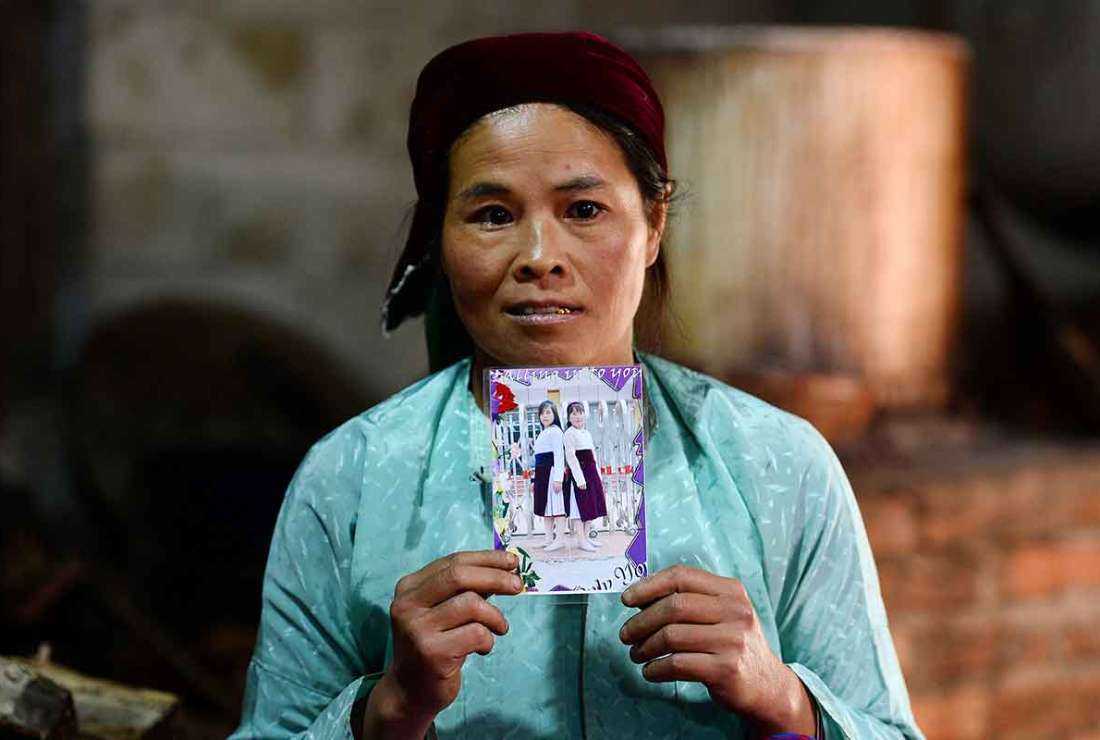
This file photo taken on Oct. 27, 2018, shows Ly Thi My, a Vietnamese mother posing with a photograph of her missing daughter Di at her house in Meo Vac, a mountainous border district between Vietnam's Ha Giang province and China. (Photo: AFP)
The global confederation of Catholic charities called on governments across the world for intense attention and collective action to combat the scourge of human trafficking.
Caritas Internationalis, the confederation of Catholic social service organizations in about 162 nations and territories, issued a statement to urge for the prevention of trafficking on the occasion of World Day Against Trafficking in Persons on July 30.
The federation cited a 2022 report from UN Office on Drugs and Crime (UNDOC), released in January, which stated trafficking cases fell globally for the first time in two decades.
The report, however, noted the decline was attributed to the impacts of the Covid-19 pandemic which pushed the traffickers to operate in the “underground.” Many cases remain unreported and undetected, it said.
There is a “need for governments to prioritize crime-prevention actions, strengthen and effectively enforce laws to protect victims, and adopt survivor-centered approaches,” Caritas stated.
It also urged governments to focus on the “need to promote socio-economic development, education and equal opportunities to address and overcome the root causes of trafficking.”
The UNDOC report titled “Global Report on Trafficking in Persons” noted the pandemic had limited the opportunities to report and potentially pushed trafficking further underground, “while constraining law enforcement capacities to target the crime.”
The report stated that trafficking cases per 100,000 persons dropped by six percent in South Asia in 2020 compared to the previous year. East Asia and Pacific regions showed a decline of 59 percent.
Meanwhile, cases in Eastern Europe and Central Asia increased by 19 percent during this period.
The effect of the pandemic on law enforcement agencies was a major reason for lesser numbers being reported, the report noted.
“Member States in these regions have attributed these lower detections to reduced law enforcement engagement in anti-trafficking activities, as pandemic preventive measures absorbed most of each state’s capacity,” the report said.
Among the victims, 41 percent initiated an escape on their own, 28 percent were saved by law enforcement agencies, and 11 percent were saved by community members or strangers.
Around 10 percent of the victims' plight was informed through initial action by the victim’s family, 9 percent through actions by other institutions or civil society, and 1 percent through other actions.
The report stated that war and conflict offered the ideal hunting grounds for traffickers.
“Most conflicts today are in Africa and the Middle East. As a consequence, most of the victims resulting from conflicts originate from and are trafficked to countries in Africa and the Middle East,” the report said.
In 2020, about 57 percent of the trafficking victims globally were females and women suffered three times more violence compared to men.
Caritas Internationalis stated that it stands in solidarity with victims and survivors of trafficking and is resolute in its efforts to end this modern-day form of slavery.
The agency cited the case of a woman from Nigeria who was trafficked to Libya with the lure of a job in Italy.
Tunde Blessing, a 24-year-old single mother from Edo State, was lured to Libya with false promises of work opportunities in Italy, Caritas said.
“Tunde faced harsh living conditions, unpaid work, and her attempt to cross the Mediterranean resulted in her eventual arrest and imprisonment,” it added.
She was repatriated with support from Caritas Nigeria which helped her restart her hairdressing business in Edo State.
Caritas Internationalis secretary general Alistair Dutton said the federation would continue its efforts in building awareness against the menace of human trafficking.
“Caritas Internationalis works with different actors, including COATNET (Christian Organizations Against Trafficking Network), to raise awareness, support survivors and promote effective policies,” Dutton said.
“Policies such as enforcing and strengthening laws and addressing underlying causes such as poverty, inequality, conflict, and discrimination are key,” Dutton added.


